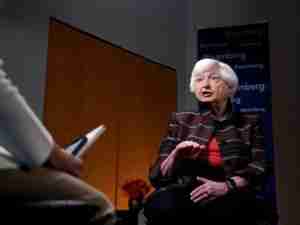Brexit Talks Deadlocked as Both Sides Prepare for Cliff Edge
By: Ian Wishart and Tim Ross | Oct 12 2017 at 10:08 AM | International Trade
The European Union said talks hit an impasse over what the U.K. owes when it leaves, increasing the chances of a messy departure as time is running out to clinch a deal.
The pound fell to the weakest in a month after chief EU negotiator Michel Barnier said there had been no discussions over the all-important bill that the U.K. has to agree it will pay before the EU will start trade talks.
Read more about Brexit’s costs and whether Britain will pay up
Barnier put the onus firmly on the U.K.’s squabbling government to find the political will to move the talks forward, while both sides raised the prospect of talks breaking down without an agreement—throwing businesses into a chaotic legal limbo.
“No deal will be a very bad deal, huh? And to be clear on our side we will be ready to face any eventualities and all eventualities,” Barnier, told reporters in Brussels on Thursday. After his words, the pound traded down by as much as 0.6 percent against the euro.
On the question of the financial settlement—the most intractable of the three pressing issues—Barnier said: “We have reached a state of deadlock which is very disturbing for thousands of project promoters in Europe and it’s disturbing also for taxpayers.”
Barnier noted that Prime Minister Theresa May had pledged in her speech in Florence last month that the U.K. would continue to pay into the EU budget for two years after the split.
He signaled disappointment that this wasn’t followed up in the negotiations this week. But in return for those payments, May wants a two-year transition period to ease the anxiety for businesses.
Different Interpretation
But the U.K. understood his words as an elegant cry for help from the Frenchman to the 27 European leaders, according to a person familiar with the U.K. team’s negotiating position: a plea to them to loosen up his mandate so he can start talking about the future alongside the divorce terms.
If true, between now and the summit a week away, signs of movement may come from the rest of the European capitals. May’s government believes the ball is still in the EU’s court—and it is now for the other leaders to decide if they want to unlock the talks.
Barnier held out hope that progress could be made at a summit in December, if the U.K. fleshes out more what May alluded to in Florence less than a month ago. That will be hard in a Conservative government constantly at war with itself on the direction of Brexit—her own chancellor was mauled by euro-skeptics for his reluctance to plow money into non-deal contingency plans.
December Target
Starting trade talks in December leaves less than a year to get a deal on trade and the transition. Some businesses won’t wait around to see the outcome, with banks the first taking steps to go. Crashing out of the bloc would wreak havoc on the economy, affecting flights, financial markets and pharmaceuticals and slapping tariffs on all foreign trade.
The U.K. is still butting against the EU’s timetable, saying it can’t sort the divorce issues, such as the U.K.’s new EU land border that will bisect the island of Ireland—- until trade talks are under way.
With talks showing increasing brinkmanship, Brexit Secretary David Davis said: “I make no secret of the fact that to provide certainty, we must talk about the future.”
The focus now turns to the summit next week of the EU’s 27 leaders. Initially trade talks were expected to start at that meeting, now the U.K. can hope for little more than encouraging words—or chinks in the EU’s armor.








